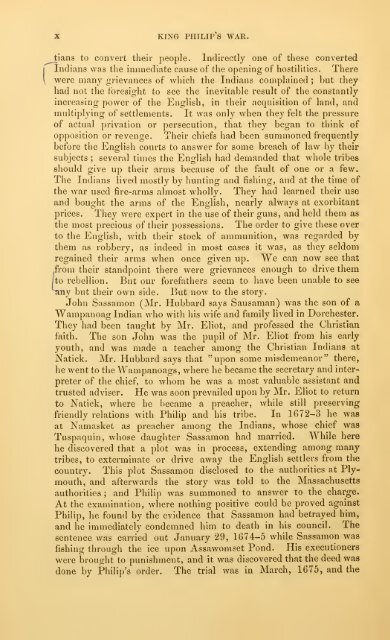Soldiers in King Philip's war. Containing lists of the soldiers of ...
Soldiers in King Philip's war. Containing lists of the soldiers of ...
Soldiers in King Philip's war. Containing lists of the soldiers of ...
You also want an ePaper? Increase the reach of your titles
YUMPU automatically turns print PDFs into web optimized ePapers that Google loves.
KING PHILIPS WAR.<br />
_tians to convert <strong>the</strong>ir people. Indirectly one <strong>of</strong> <strong>the</strong>se converted<br />
Indians was <strong>the</strong> immediate cause <strong>of</strong> <strong>the</strong> open<strong>in</strong>g <strong>of</strong> hostilities. There<br />
were many grievances <strong>of</strong> which <strong>the</strong> Indians compla<strong>in</strong>ed ; but <strong>the</strong>y<br />
had not <strong>the</strong> foresight to see <strong>the</strong> <strong>in</strong>evitable result <strong>of</strong> <strong>the</strong> constantly<br />
<strong>in</strong>creas<strong>in</strong>g power <strong>of</strong> <strong>the</strong> English, <strong>in</strong> <strong>the</strong>ir acquisition <strong>of</strong> land, and<br />
multiply<strong>in</strong>g <strong>of</strong> settlements. It was only when <strong>the</strong>y felt <strong>the</strong> pressure<br />
<strong>of</strong> actual privation or persecution, that <strong>the</strong>y began to th<strong>in</strong>k <strong>of</strong><br />
opposition or revenge. Their chiefs had been summoned frequently<br />
before <strong>the</strong> English courts to answer for some breach <strong>of</strong> law by <strong>the</strong>ir<br />
subjects ; several times <strong>the</strong> English had demanded that whole tribes<br />
should give up <strong>the</strong>ir arms because <strong>of</strong> <strong>the</strong> fault <strong>of</strong> one or a few.<br />
The Indians lived mostly by hunt<strong>in</strong>g and fish<strong>in</strong>g, and at <strong>the</strong> time <strong>of</strong><br />
<strong>the</strong> <strong>war</strong> used fire-arms almost wholly. They had learned <strong>the</strong>ir use<br />
and bought <strong>the</strong> arms <strong>of</strong> <strong>the</strong> English, nearly always at exorbitant<br />
prices. They were expert <strong>in</strong> <strong>the</strong> use <strong>of</strong> <strong>the</strong>ir guns, and held <strong>the</strong>m as<br />
<strong>the</strong> most precious <strong>of</strong> <strong>the</strong>ir possessions. The order to give <strong>the</strong>se over<br />
to <strong>the</strong> English, with <strong>the</strong>ir stock <strong>of</strong> ammunition, was regarded by<br />
<strong>the</strong>m as robbery, as <strong>in</strong>deed <strong>in</strong> most cases it was, as <strong>the</strong>y seldom<br />
rega<strong>in</strong>ed <strong>the</strong>ir arms when once given up. We can now see that<br />
.from <strong>the</strong>ir standpo<strong>in</strong>t <strong>the</strong>re were grievances enough to drive <strong>the</strong>m<br />
/to rebellion. But our forefa<strong>the</strong>rs seem to have been unable to see<br />
any but <strong>the</strong>ir own side. But now to <strong>the</strong> story.<br />
John Sassamon (Mr. Hubbard says Sausaman) was <strong>the</strong> son <strong>of</strong> a<br />
Wampanoag Indian who with his wife and family lived <strong>in</strong> Dorchester.<br />
They had been taught by Mr. Eliot, and pr<strong>of</strong>essed <strong>the</strong> Christian<br />
faith. The son John was <strong>the</strong> pupil <strong>of</strong> Mr. Eliot from his early<br />
youth, and was made a teacher among <strong>the</strong> Christian Indians at<br />
Natick. Mr. Hubbard says that "upon some misdemeanor" <strong>the</strong>re,<br />
he went to <strong>the</strong> Wampanoags, where he became <strong>the</strong> secretary and <strong>in</strong>terpreter<br />
<strong>of</strong> <strong>the</strong> chief, to whom he was a most valuable assistant and<br />
trusted adviser. He was soon prevailed upon by Mr. Eliot to return<br />
to Natick, where he became a preacher, while still preserv<strong>in</strong>g<br />
friendly relations with Philip and his tribe. In 1672-3 he was<br />
at Namasket as preacher among <strong>the</strong> Indians, whose chief was<br />
Tuspaqu<strong>in</strong>, whose daughter Sassamon had married. While here<br />
he discovered that a plot was <strong>in</strong> process, extend<strong>in</strong>g among many<br />
tribes, to exterm<strong>in</strong>ate or drive away <strong>the</strong> English settlers from <strong>the</strong><br />
country. This plot Sassamon disclosed to <strong>the</strong> authorities at Plymouth,<br />
and after<strong>war</strong>ds <strong>the</strong> story was told to <strong>the</strong> Massachusetts<br />
authorities ; and Philip was summoned to answer to <strong>the</strong> charge.<br />
At <strong>the</strong> exam<strong>in</strong>ation, where noth<strong>in</strong>g positive could be proved aga<strong>in</strong>st<br />
Philip, he found by <strong>the</strong> evidence that Sassamon had betrayed him,<br />
and he immediately condemned him to death <strong>in</strong> his council. The<br />
sentence was carried out January 29, 1874-5 while Sassamon was<br />
fish<strong>in</strong>g through <strong>the</strong> ice upon Assawomset Pond. His executioners<br />
were brought to punishment, and it was discovered that <strong>the</strong> deed was<br />
done by <strong>Philip's</strong> order. The trial was <strong>in</strong> March, 1675, and <strong>the</strong>

















